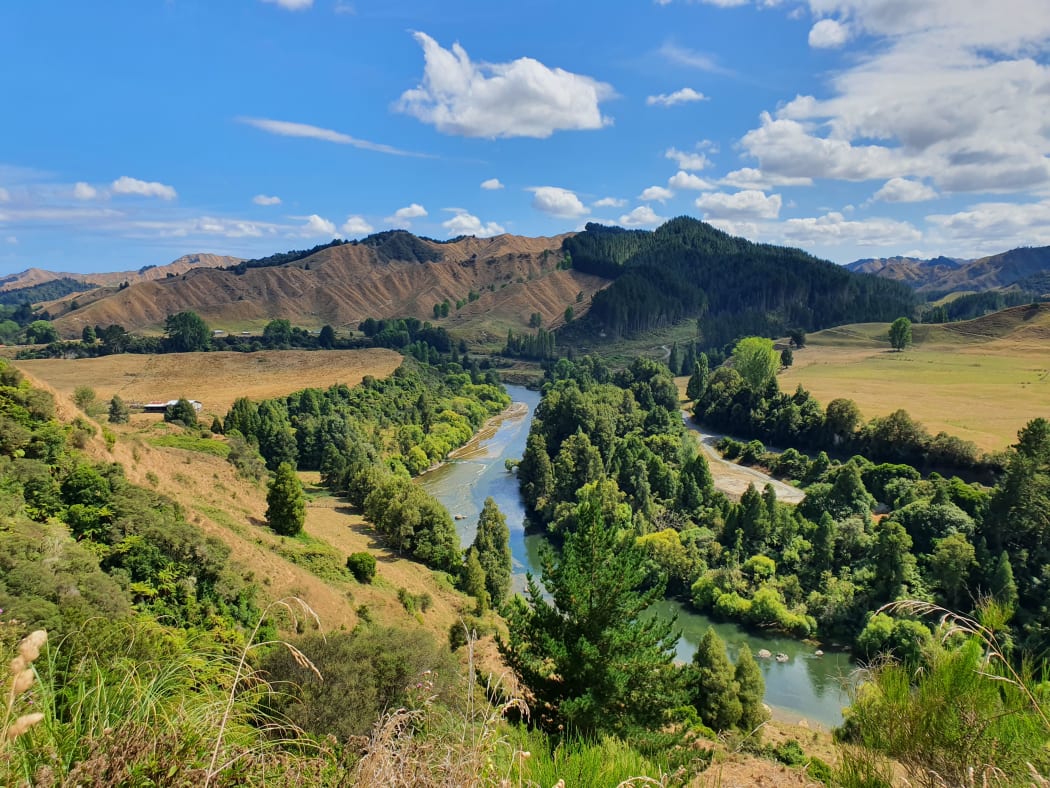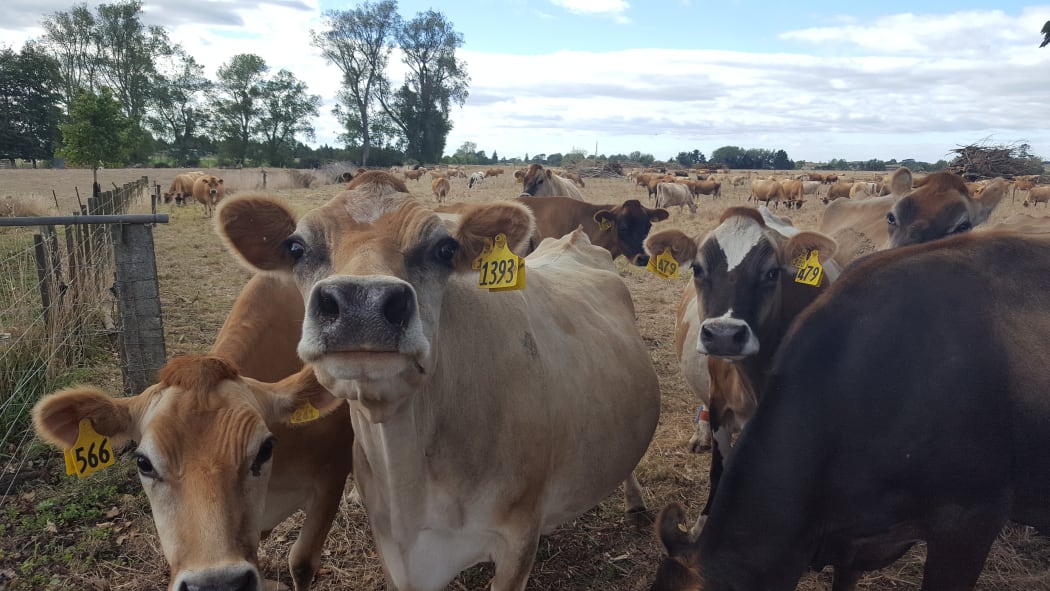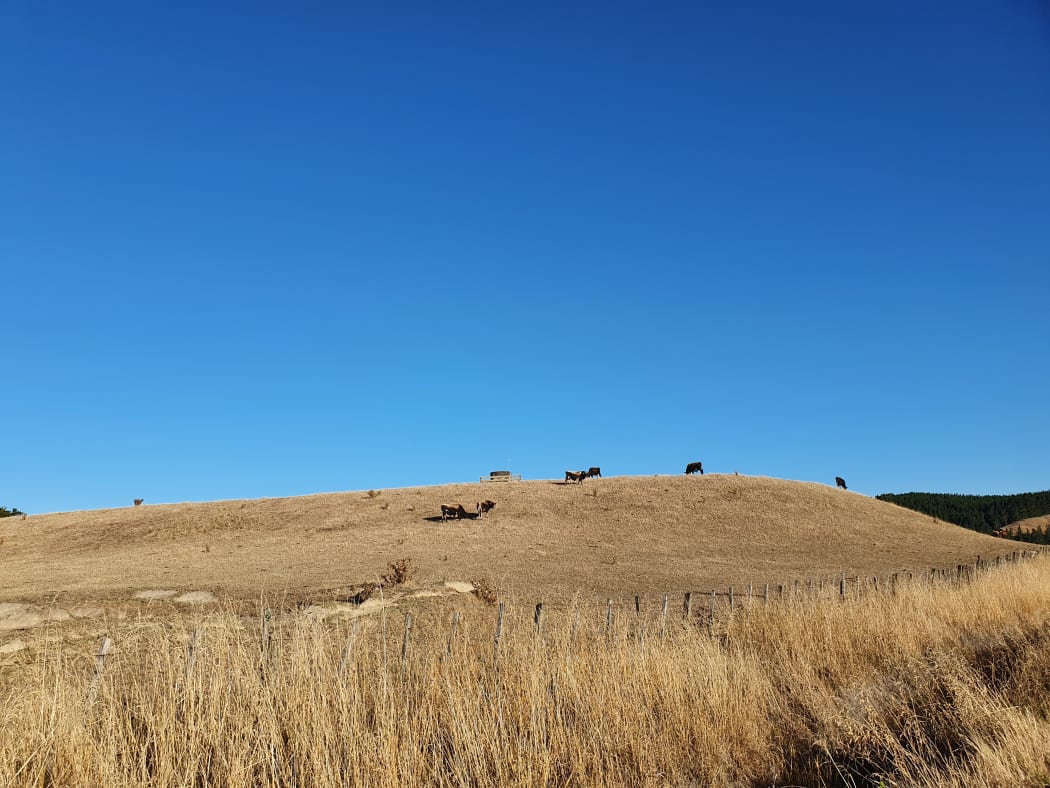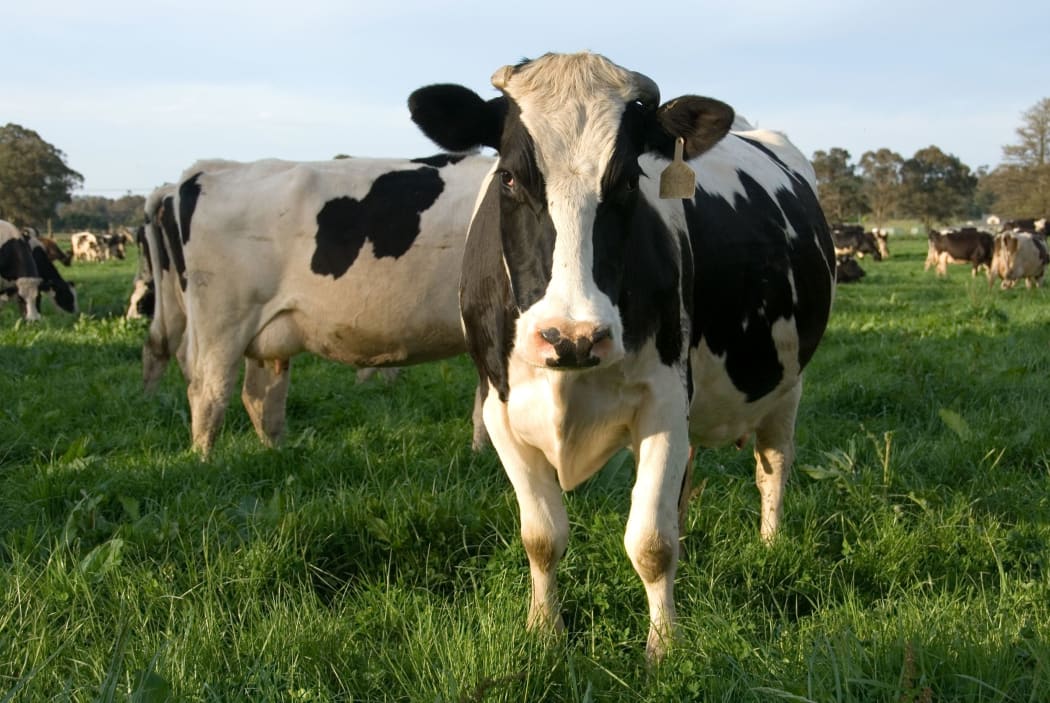
Photo: RNZ/Carol Stiles
In Northland Kaitaia had a surprise four millimetres of rain this week, following nine last week . Dargaville's had less and Kerikeri more. Areas that have had good rain have started to green up but others look like the Sahara desert. Hopefully the little sprinklings are an indication the weather pattern has changed - it's certainly cooler. Stock are looking surprisingly good and dairy herds are tucking in to palm kernel and are on rations of baleage. Cattle are eating in the kikuyu base more than they have in a very long time...it's not really to their palate - they don't mind the green leaves but there's not many of those around any more. The base is like eating poor quality hay.
Around Pukekohe it's been fine and sunny except for scattered light showers from Thursday. Crops still need irrigation. With no chemical products available to control the tuber moth, considerable damage has been done to potato crops. In some instances, the moth attack has been so severe that potatoes haven't been harvested resulting in big financial losses to the growers. With concern over the coronavirus mounting, companies servicing the vegetable industry are sending a plethora of emails outlining how they intend to protect their staff and do business at the same time.
People heading to work in Hamilton on Friday morning would have seen a glorious rainbow - which means it was raining somewhere! In most places only a couple of millimetres have fallen this week. With the sniff of rain fertiliser trucks were busy. Paddocks now have a slight green tinge but steeper hills are still very brown. Heavy dews are putting a little moisture into the ground. The mornings have been much cooler - only ten degrees at 9.30 on Thursday.

A dry Waikato for this jersey herd Photo: Susan Murray RNZ
The first of a planned 47 charter vessels carrying new season kiwifruit has left Tauranga Harbour bound for Japan. The ship is carrying just over a million trays of gold fruit. Zespri says while there are ongoing challenges associated with COVID-19 all ports in Japan, Korea and Europe are functioning well and have labour available. This season Zespri's expecting to supply about 155 million trays, or about 600,000 tonnes of kiwifruit to markets overseas. With the news that borders are closed to our Pacific neighbours, hundreds of RSE workers who usually work in packhouses or picking in orchards won't be able to make it to New Zealand.
Taranaki hasn't had the rain that's been forecast. It was the favoured province - but that's changed. It's dry between Patea and Opunake and in the province's north. Central and higher altitude areas are faring better and have had good rain but even there, a lot of supplement has been fed out. Many farms are on once-a-day and production is dropping away. Space at the works is freeing up.
Across the island Gisborne has freshened up and is looking a bit greener than most other North Island regions. Leaderbrand, a very big grower of salads and vegetables, says the season's been a good one with good yields and decent weather for harvesting .The company also has grapes and its chardonnay, pinot gris and sauvingnon blanc crops are already off the vines and in vats. The company is bracing to deal with any spread of coronavirus and says it's critical that it keeps the supply of vegetables flowing into the market but at the same time wants to keep its 500 employees safe. Leaderbrand is not mixing any of its planting and harvesting teams and has re-jigged the way they operate so people can keep a metre-and-a-half apart. Pastoral farmers have been under pressure for feed but they now have the chance to grow grass before it gets cold.

A parched paddock in southern Hawkes Bay Photo: RNZ/Sally Round
In Hawkes Bay the apple harvest is running extremely smoothly because there's been no rain. The fruit is of exceptional quality, with great colour and taste and very few blemishes. One grower, who's been in the industry for decades, says he hasn't seen a season like it since 1992. The bulk of the royal gala harvest should be wrapped up by this weekend . It's treated with a product to delay ripening and which should give a buffer if the fruit can't get offshore when exporters had planned. There's a shortage of containers because a lot are parked up in China. One exporter is bringing in two reefer boats to take apples - they're what exporters used before they started packing into container ships. Apples will be loaded into refrigerated holds in pallets. On the Heretaunga plains, where pastures are sheltered they're green but elsewhere in Hawkes Bay it's either brown or grey .
In southern Hawkes Bay and Manawatu some dairy herds are being dried off.
The sheep breeder we rang in Wairarapa is feeding ewes on baleage and barley and has just stocked up on sheep nuts - he wasn't alone - apparently there's been a run on them. Some Wairarapa dams are drying up and that's a huge worry for farmers who don't have reticulated water. There's concern about how farmers will cope if meat works have to shut because of coronavirus. Farms are in drought and have very little feed for animals and if farmers can't get them off the farm it'll be dire. Grape growers and wine growers are expecting vintages beyond their wildest dreams - at least some people are happy!
Hopping across to the South Island now and it's still very dry around Golden Bay and west of Nelson. It's a green drought, the slight respite from the rain that came in late February has largely gone and farmers are back to trying to conserve pastures as best as they can. They're waiting for rain to set up for winter, however milk production on our contact's farm is 25% up for the month but he says that's more a reflection of how bad it was last year. It's still hard to get surplus stock to the meat works. Farmers are pleased with the work Fonterra's done over the past six months to strengthen its financial position. They are starting to think about how to run their farms with covid 19 in the country; plans for social distancing, coping with skeleton staff if required and what supply chains will be in place for getting animal health remedies and so on. The farmer also said a silver lining may be banks offering better interest rates so they can start repaying debt rather than just servicing the loans.
Marlborough is also fairly dry. Farmers are starting to feed breeding ewes to keep their condition up now the rams are with them. Winter cereals, oats, rye, corn and annual ryegrassses are going in. Water restrictions are cutting in and out at present. Irrigators can run for a couple of days, but then are shut off for a couple. Luckily it's late in the grape growing season so won't impact on vineyards too badly. This is unlike last year where restrictions came in at the end of January. That said the area hasn't had any rain to speak off all year and the season could end up drier than last year.
Canterbury is still dry particularly nearer the coast. Pasture growth is minimal and winter feed crops are really struggling. As a result store stock are hard to shift. Harvest on arable farms is all but done with only late crops like radish still to go. Preparation of paddocks for autumn sowing is in full swing while conditions are good.

Photo: 123RF
Conditions were settled on the West Coast this week; lots of sunshine with some rain at nights. Temperatures have dropped however and autumn has arrived. Cows are milking okay ... in fact March is usually good on the coast.
Otago is also faring pretty well .. milk production on our contact's farm is slightly up on last year. They could do with a shower of rain but everyone's trying to get winter jobs done. Things like emptying effluent ponds need fine weather. The mornings are suddenly cool. There was nearly a frost this week so that was a bit of a wake up call that the season is changing.
And Southland is also going into autumn in good shape. The region's had regular rain. There have been some cold mornings here too though .. the gauge hit zero in some places .. but the nippy feeling doesn't linger and by later in the day temperatures are into the 20s. Stock are going well, milking is humming along. Lambs are still a little slow to get up to killable weights, but generally this is the best place to farm in New Zealand, so we were told.

